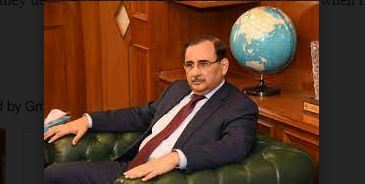Anjum Nisar for addressing structural vulnerabilities thru smooth energy at competitive rates
ISLAMABAD: /DNA/ – The Federation of Pakistan Chambers of Commerce and Industry’ Businessmen Panel (BMP) has called for putting the economy on a sustainable growth, asking the government to provide incentives to the trade and industry, as the business confidence has taken a significant hit due to lack of investment and growth, exacerbating economic challenges further.
FPCCI former president and BMP Chairman Mian Anjum Nisar asked the government to address the underlying structural vulnerabilities through smooth energy supply at competitive rates, as country’s overall export proceeds continued to shrink, showing a pessimism about the conditions and prospects of the businesses amidst various economic crises to worsen business insecurity.
Mian Anjum Nisar underscored the need for the government to take immediate steps to address the concerns of the business community, including implementing policies that support business growth, promoting employment and productivity through incentives, and addressing inflation and currency depreciation. Failure to do so will only exacerbate the country’s economic challenges and hinder its ability to attract investment and create jobs.
The BMP Chairman said that the government has increased the gas and electricity tariffs and, at the same time, also the subsidy has been phased out, which will further increase the cost of production.
Month on month increases in consumer prices may be countered by a further mean reverting international commodity prices and some exchange rate stability due to decreased pace of depreciation.
He added that the current vicious uncertainty, which is aggravating each other’s impact, is eroding business confidence, as the political tug of war and the inconsistent approach of the government is leading to a trust deficit between the business community and the government and between the international community and the government.
The Businessmen Panel chairman said that the export drop shows the government would find it difficult to achieve the industrial growth and export target, leading to more pressure on foreign exchange reserves of the country. Quoting the data, he pointed out that remittances witnessed significant drop during the first half of the current year, exports declined, foreign direct investment dipped by 654 million dollars, portfolio investment plummeted from negative 45.5 to negative 1032 million dollars, Public Sector Development Program decreased by 122 billion rupees and credit to private sector from 1043.1 to 703.6 million rupees. He added that the government’s policies that promote employment and productivity through incentives to businesses, including tax benefits, subsidies, and skill development, can help. He also highlighted that inflation is the most cited problem that businesses would like the government to solve. Referring to the report of business confidence, he said 66% of businesses perceive themselves as facing bad or worse conditions, with a 7% increase in businesses reporting very bad business conditions. Most business types reported the business being in a bad state, with a 50-50 split between good and bad conditions in the construction, cosmetics, and industrial machines and equipment sector.
Around 70% of businesses perceive bad conditions in Sindh and KPK, and 64% in Punjab. The report highlights that 61% of businesses in the first quarter of 2023 said future expectations are negative while the Net Future Business Confidence score has worsened by 11% since the previous quarter and is now at -22%.
He added that political chaos in the country is having a serious negative impact on business and the life of the general public. Due to the lack of political stability, investors and industrialists are facing an uncertain situation. He says businesses in Pakistan are faced with multiple calamities, including decades-high inflation killing consumer purchasing power, an absolute lack of stability in the political system causing an environment of uncertainty and mistrust, and poor economic policies leading to a lack of investment and growth. He emphasized the need for the government to take bold steps to improve the situation, including implementing policies that support business growth and addressing the concerns raised by the business community.
It is to be noted that remittances in August 2023 totalled $2.09 billion. While this was a slight improvement from the previous month, it was a significant decline from August 2022 when remittances amounted to $2.74 billion. This decline, while concerning, was not unexpected. Remittances have been falling for some time: annual remittances were down for the first time in six years in FY23. And FY24 has not been off to a promising start.
Over the last decade, remittances have declined annually twice. The first time was in FY17 when they fell by a little over $550 million. The second time was in FY23, but this time the fall was much larger — $4.25 billion. This figure is obviously worrisome. It is a 13.59 percent decline at a time the country needs every dollar it can get. And it is more than half of the central bank’s current reserves, which stand at $7.78 billion as of September 1, 2023.
The downtrend has bled into the current fiscal year, with remittances in the first two months amounting to $4.12 billion, down 21.57 percent from July-August FY23 when they clocked in at $5.26 billion.
According to the latest SBP data, remittances showed a slight improvement on a monthly basis in August, rising by 3.15 percent from July’s figure of $2.03 billion. However, they declined by 23.74 percent from August 2022 when remittances stood at $2.74 billion.

















